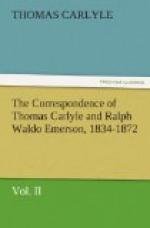And yet I owe you all my story, if story I have. I have been something of a traveler the last year, and went down the Ohio River to its mouth; walked nine miles into, and nine miles out of the Mammoth Cave, in Kentucky,—walked or sailed, for we crossed small underground streams,—and lost one day’s light; then steamed up the Mississippi, five days, to Galena. In the Upper Mississippi, you are always in a lake with many islands.
“The Far West” is the right name for these verdant deserts. On all the shores, interminable silent forest. If you land, there is prairie behind prairie, forest behind forest, sites of nations, no nations. The raw bullion of nature; what we call “moral” value not yet stamped on it. But in a thousand miles the immense material values will show twenty or fifty Californias; that a good ciphering head will make one where he is. Thus at Pittsburg, on the Ohio, the “Iron” City, whither, from want of railroads, few Yankees have penetrated, every acre of land has three or four bottoms; first of rich soil; then nine feet of bituminous coal; a little lower, fourteen feet of coal; then iron, or salt; salt springs, with a valuable oil called petroleum floating on their surface. Yet this acre sells for the price of any tillage acre in Massachusetts; and, in a year, the railroads will reach it, east and west.—I came home by the great Northern Lakes and Niagara.
No books, a few lectures, each winter, I write and read. In the spring, the abomination of our Fugitive Slave Bill drove me to some writing and speech-making, without hope of effect, but to clear my own skirts. I am sorry I did not print whilst it was yet time. I am now told that the time will come again, more’s the pity. Now I am trying to make a sort of memoir of Margaret Fuller, or my part in one;—for Channing and Ward are to do theirs. Without either beauty or genius, she had a certain wealth and generosity of nature which have left a kind of claim on our consciences to build her a cairn. And this reminds me that I am to write a note to Mazzini on this matter; and, as you say you see him, you must charge yourself with delivering it. What we do must be ended by October. You too are working for Sterling. It is right and kind. I learned so much from the New York Tribune, and, a few days after, was on the point of writing to you, provoked by a foolish paragraph which appeared in Rufus Griswold’s Journal, (New York,) purporting that R.W.E. possessed important letters of Sterling, without which Thomas Carlyle could not write the Life. What scrap of hearsay about contents of Sterling’s letters to me, or that I had letters, this paltry journalist swelled into this puff-ball, I know not. He once came to my house, and, since that time, may have known Margaret Fuller in New York; but probably never saw any letter of Sterling’s or heard the contents of any. I have not read again Sterling’s letters, which I keep as good Lares in a special niche, but I have no recollection of anything that would be valuable to you. For the American Public for the Book, I think it important that you should take the precise step of sending Phillips and Sampson the early copy, and at the earliest. I saw them, and also E.P. Clark, and put them in communication, and Clark is to write you at once.




